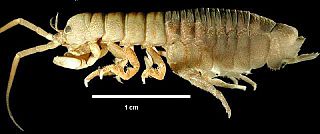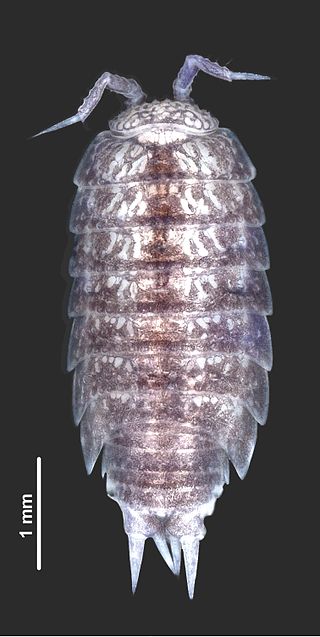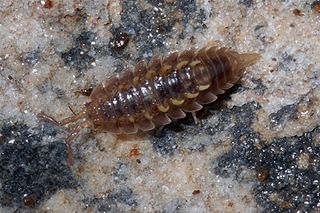
Isopoda is an order of crustaceans. Members of this group are called isopods and include both aquatic species, and terrestrial species such as woodlice. All have rigid, segmented exoskeletons, two pairs of antennae, seven pairs of jointed limbs on the thorax, and five pairs of branching appendages on the abdomen that are used in respiration. Females brood their young in a pouch under their thorax called the marsupium.

Sphaeromatidae is a family of isopods, often encountered on rocky shores and in shelf waters in temperate zones. The family includes almost 100 genera and 619 known marine species. Within these genera, there are groups that share distinctive morphologies; further research may reclassify these genus-groups as separate families.
Onchotelson is a genus of isopod crustaceans in the family Phreatoicidae, which is endemic to Tasmania. It contains two species, both of which are listed as vulnerable on the IUCN Red List:
Uramphisopus is a monotypic genus of isopod crustaceans in the family Phreatoicidae. The only species is Uramphisopus pearsoni. It is only found in Brandum Bay basin in the north of Great Lake, Tasmania.

Charles Chilton was a New Zealand zoologist, the first rector to be appointed in Australasia, and the first person to be awarded a D.Sc. degree in New Zealand.

The Asellidae are a family of isopod crustaceans, one of the largest families of freshwater isopods, living in both epigean and hypogean habitats in North America and Europe.
Iais is a genus of isopod crustaceans. Iais species are found in association with larger isopods of the family Sphaeromatidae, usually on the ventral surface of the larger animal, between the pereiopods and on the pleopods. They are native to Australasia and South America, although Iais californica and its host Sphaeroma quoyanum have invaded California, and I. californica was first described from Sausalito, California.

Phreatoicidea is a suborder of isopod crustaceans. Extant species are confined to freshwater environments in South Africa, India, and Oceania. This seemingly Gondwana-derived distribution belies the fact that the group once had a cosmopolitan distribution; fossils which can be assigned to the Phreatoicidea are the oldest isopod fossils, and are found throughout the world. In the intervening 325 million years, phreatoicideans have changed little, and are thus considered living fossils.
Phoratopus remex is a species of isopod crustaceans known from only two specimens, and first described in 1925 by Herbert Matthew Hale (1895–1963). It lives on the continental shelf at Encounter Bay and Fowlers Bay, South Australia. Unlike all other Isopods, it is placed in its own family, Phoratopodidae and suborder, Phoratopidea.

Styloniscidae is a family of woodlice, including the following genera:

The Arcturidae are a family of marine isopod crustaceans in the suborder Valvifera. Members of the family resemble woodlice and are found globally in cooler areas in shallow seas.

Cirolana is a genus of isopod crustaceans.

Exosphaeroma is a genus of marine isopod of the family Sphaeromatidae. This genus is found in shallow ocean waters worldwide. It is notable for being one of the few genera of sphaeromatid to be found in the southern reaches of the Southern Ocean. The greatest diversity of Exosphaeroma occurs in the Southern Hemisphere.

Deto is a genus of woodlice in the family Detonidae. Members of this genus can be found along the coasts in areas of New Zealand, Namibia, South Africa and Australia.

Euidotea durvillei, known commonly as the red seaweed isopod, is a species of marine isopod found in New Zealand.
Scutuloidea kutu is a species of marine isopods in the family Sphaeromatidae, first described by Stephenson and Riley in 1996. No subspecies are listed in the Catalog of Life. The name "kutu" was chosen as a metaphor, as the species lives on seaweed.

Scutuloidea maculata is a species of marine isopods in the family Sphaeromatidae, first described by Charles Chilton in 1883. No subspecies are listed in the Catalogue of Life.
Anuropus is a genus of isopods in the suborder Cymothoida. As of 2021, it is the only genus in the family Anuropidae.

Euidotea is a genus of marine isopods belonging to the family Idoteidae. The species of this genus are found in Australia and New Zealand.
Hypsimetopidae is a family of freshwater isopods.













